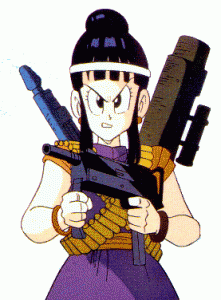Ask John: Are Japanese Mothers Too Overbearing?
Question:
In Dragonball Z, Chichi is an unrelenting annoying b*tch. She does not stop yelling, she does not cut the damn umbilical cord with Gohan, and she’s so blinded by her own maternal instinct that she doesn’t listen to the voice of reason when everyone around her is telling her that her son could save the world. Does Akria Toriyama hate his mom or something? Every time we see Chichi, she is just the most annoying person on the show. [This] really got me wondering about the familial relationships between mothers and sons in Japanese culture. The only point of reference I have is anime, which we all know is way off. But still, the way that interaction is presented in anime, by way of Chichi in DBZ, or even the mother-son incest hentai, there seems to be an almost persistent portrayal of the overly aggressive female.
Is there any sort of rational basis for all the hyperbolic characters I see in anime? Or am I just taking things too literally?
Answer:
Dragonball’s Chi-chi is what’s known as a “kyoiku mama,” or “education mama.” The overbearing “kyoiku mama” that demands her child concentrate on educational advancement to the exclusion of everything else has existed in Japanese society since at least the early 1900s, but became a formally named personality type in the 1960s.
The kyoiku mama is motivated by two goals: a desire to have her child succeed in a Japanese society in which educational advancement can be the first step in a systematic career placement path, and a compulsive prideful and selfish desire to outpace her neighbors by raising a more successful child. Much criticism has been leveled at the kyoiku mamas for raising children that are socially maladjusted, over-stressed, and even suicidal.
The kyoiku mama phenomena was especially prevelant during the 1980s when Japan’s economic growth seemed limitless. In fact, during those days there were even commonplace urban legends of kyoiku mama even sexually gratifying their sons to relieve sexual frustration and keep their boys at home studying instead of out dating girls! So it shouldn’t come as a surprise to see Akira Toriyama’s lighthearted 80s Dragonball manga skewer this particular archetype by illustrating how narrowminded and unrealistic it can be.
Add a Comment
You must be logged in to post a comment.



I didn’t see Chi Chi as a butch. I do see her as the most tunnel-visioned mother in the history of anime! She was right, I think. Who wants a guy as dumb as Goku for another generation? Goku’s a great fighter, but he wasn’t too bright.
John: So, Yagami Raito’s mother in Death Note fits in the kyoiku mama stereotype?